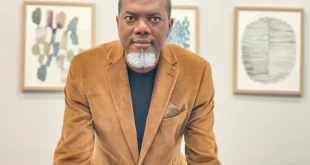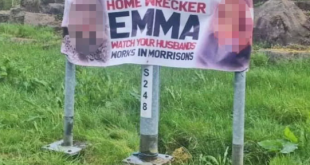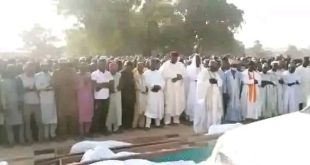Initially, he started out by shopping some of his best scripts around. But he later found the passion to take on the risks and produce his own movies. While it proved excessive initially, he eventually found his level and started working with major South African TV networks. Today, in partnership with his South African partners, he now throws Sacred Fest, one of the biggest Gospel concerts in South Africa.
However, cinema remains his passion. In 2021, he also made another foray into his musical side and released an EP. But he could never let go of cinema, production and scriptwriting. As he strives to make an impression on the South African film industry, he hopes to make another impression on Nigeria.
A few days ago, Pulse spoke with Uzoma about filmmaking, Nollywood, his vision and more.
Pulse: How are you doing? What’s going on?
Jeffrey: I’m good. Just a rainy Sunday. It’s raining cats, dogs, pigs, and every single animal you can think of.
Pulse: South African weather is very different.
Jeffrey: Is it very hot on that side?
Pulse: Ah! Baba if you come out here the sun will chase you back inside.
Pulse: Meanwhile, how did you get into movies?
Jeffrey: In the film industry, to be frank, I started off creating magazine shows for tv and I was trying to put together an Online TV Channel in 2014/2015 while I was living in a place called Sunny Side Pretoria. It was like a channel where people can find exciting content like the Nigezie and Sound City energy but online. Then I was working with David, a Congolese guy who was a DOP.
He was shooting the project and I was directing the creative process. He was the one who said to me “I see what you’re doing and I feel very strongly that you can write. I feel you can put together a nice movie because of the way you write. Try putting a film together if you can.” That’s me running into scripting for the first time and that’s my journey into shooting 1 hour movies with MNET in 2015 by taking David’s advice.
Pulse: Do you and David still have a relationship?
Jeffrey: David is my go-to Francophone fellow. He’s based in Congo now and he’s a real jungle hustler. Back in the day, that guy can trek for Africa just to get something done, he will walk the distance. We still have a good working relationship but we haven’t worked recently due to the distance we keep a good virtual relationship.
Pulse: What is your exact role in the movie industry? How would you describe yourself? Is it a director? screenwriter? producer? casting director? What is it?
Jeffrey: I started off writing and directing but when you start in the industry as an indie director or producer in the movie industry, you’re left to get things done on your own. So I was forced to learn a lot. So I started off directing, producing, writing, editing, and casting as an indie filmmaker. But I have been able to find my niche – creating a show, writing the script, and directing as well – that’s the 3 angles I think I’m well endowed in as a filmmaker.
Pulse: What has been the most successful production in your work in South Africa and Africa generally?
Jeffrey: My portfolio has been a couple of TV movies for MNET in South Africa that were done in local languages for Mzansi Magic. Technical directing for Sacred Fest, our faith based concert that has been running for over 3 years now. I also have a short film titled ‘The Wolf of Sunny Side’ and I’m currently working with some distributors and producers from South Africa we’re trying to move the structure from a short film to Drama series and this is what is in the pipeline as I speak to you.
With that said, aside from creating this content for MNET, I also co-produce a gospel concert called ‘Sacred Fest’ which will happen in South Africa on the 25th of December in Sun City. I do most of the creative production and I’m directing as well.
I feel like so far so good, I have spent most of my start-up years developing projects I feel and this has taken me up to four to five years. And I think this is something we lack as African creatives because I don’t know if it’s the struggles as Africans that don’t allow us to put in our best in a project and this tells on the screen.
You see the project ‘Wolf of Sunny Side’ I told you about, I have had it since 2014 and it’s only now that we are fully ready to shop it around.
That’s how deep I think the film and television industry is because you can meet someone who hasn’t had a big movie but they understand that it takes time to put together a solid project. I mean, look at HOLLYWOOD, look at how long it takes them to make something special. It takes a long period and special minds to work with the right people to create something worth spending your time, money, or data on. And this is my guiding belief and it’s what has guided my projects so far. And with that said, my biggest projects are still in the pipeline.
Pulse: Thank you very much for that answer, chief. That said, are you intentionally trying to stay away from Nollywood?
Jeffrey: Not really. You know I moved to South Africa in 2013 and since then, I have been able to adapt to the South African scene and I pride myself on my adaptability. So it’s not easy to switch but we just commissioned a couple of scripts with Nigerian writers, so next year (2023) is when I think my footprint will be felt in Nollywood by the grace of God. So I’m not running from Nollywood, but I’m of the mindset that whenever you go into a space, you should be ready for the heat or be ready to add value to the scene.
Pulse: Nollywood is fast growing if I may say so myself and while the quality of the production is improving and investors are willing to put in more money. The types of movies getting that money are comedy movies because perhaps some investors think that’s how they can make a return on their investment. So a lot of producers aren’t attempting proper stories from different angles or at least they don’t attempt them as much. Does this upset you?
Jeffrey: [Laughs] Not necessarily. I believe every creator has the right to do what they want and they are aware of their capacity. If you feel making a comedic movie is where your power lies then go for it but then, it boils down to what I’m saying. I’m even happy that you’re not a filmmaker but you get it.
A lot of people are making certain types of movies because they think they will make a return on investment faster with such genres. Yes, I know it’s business and it’s important that money is made but whatever you want to do, spend some time on the narrative, storyline, character development, have your audience at mind and create something engaging and thought-provoking. Whenever you watch the majority of Hollywood movies, you get to say “Wow”, that wow factor is not a fluke.
I admire what Nollywood is doing in cinematography and I know it will only get better because there are great talents in that space. However, I have seen some A-list projects with viral marketing but I couldn’t sit down for ten minutes to watch the projects. And this is because as a critical viewer, I want to be entertained and take something from the movie. Without offending others, the last Nollywood movie I enjoyed is Blood Sisters by Ebonylife studio in partnership with Netflix and before that Ramsey Noah’s ‘Living In Bondage’. I loved that movie so much that I was scammed out of a few thousand on Twitter in my effort to communicate with the producer, a Naija Boy getting scammed.
A company like EbonyLife understands what it takes to make a good movie and that’s why they can get originals.
I think we focus more on marketing and that’s why they pack celebrities or known faces into a movie and give it a huge budget. I think this will change sooner or later. I think the time will come when Nigerians will want films where they will be emotionally engaged and will give the film a standing ovation at the end because of emotionally committed they are as an audience and not because of the number of celebrities in it.
Pulse: Baba, you have answered all the questions I outlined, everything!
[laughs] I’m just really passionate about this topic.
Pulse: Now here is something I would like to know. What type of investors do you think we need? Now here me out, I don’t see why Nollywood didn’t do a movie like ‘The Woman King’. I think there are a lot of books that can be adapted. A lot of stories can be told. So what do you think we need to focus on story-wise and what are the roles of the investors?
Jeffrey: I don’t think anyone can tell a storyteller which story to tell. But one thing I can say is that there are many epic stories we can tell but these stories require a hefty budget which the Nigerian ecosystem lacks.
If you’re going to tell these epic stories in a way that matches international standards, you’re going to need a big budget which the country on its own doesn’t have and the government isn’t even helpful.
Let me use South Africa as an example, there are large government institutions that are willing to invest in big-screen movies. There are also distribution agencies that can approach banks and get funding. This is the private sector coming on board so when you watch a South African movie, you get to see the quality.
When there’s proper funding, the creative will be able to think broader. A film about Sango will be able to use the right VFX and settings that will wow the audience and compete internationally. The writers will be able to spend time in its research. With these things lacking in Nollywood, it’s very difficult to tell epic stories because imagine the cost of getting a thousand horses or the right VFX
Until the government and the people understand that we have a gem called Nollywood and we need to treat it as we should, we will continue playing second fiddle to not even Hollywood but South Africa while basking in our Naija vibes and large population.
That’s why I don’t blame people for being restricted and making what they think will give them money because nobody is funding a project in a way that will allow you just focus on a film for three to four years.
Pulse: So what are the directors in Nigeria and South Africa that you admire?
Jeffrey: I’m an admirer of Ramsey Noah and what he has been able to achieve in movie making. I think I like the movies he has been able to work on. A lot of people don’t pay attention to pacing in movies but that’s something Ramsey has. I’m also very intrigued by Akin Omotosho who’s based in South Africa but is a Nigerian.
In South Africa, I like Thabang Moleya and Mandla N. I am inspired by their work.
Pulse: Let us look at some actors. If you come to Nigeria, who are the actors you will like to cast?
Jeffrey: I love Stanze ( Stan Eze) and I love Deyemi Okanlawon as well.
Pulse: What about South Africa?
Jeffrey: Ah! There are a lot of South African actors I admire so it will be hard to choose. I hope I will get to work with all of them at some point.
Jeffrey: Let me just add something to this conversation. I think the real agenda of this conversation in my heart is to address the Nollywood lack of proper narrative storytelling techniques in Nollywood. I think a proper story must be able to emotionally engage the audience. We need to be able to empathize with what we see on the screen so much that we can’t stand up from our seats.
Everybody on the continent is currently picking up in terms of Cinematography. There’s this guy (Loukman Ali) from Kenya who came to Nigeria to direct the movie ‘Brotherhood’ . He’s absolutely good. So we need to move further into how better we can get with our narrative story telling both with the pen and camera.
When you tell a story, you must understand that your audience comes first regardless of it being a business. You must pay attention to what emotion appeals to your audience and which one you are trying to elicit and how best can you elicit that emotion.
Other industries can come to the tabloids and compliment us but deep down, they know that they won’t sit through some nollywood films for two hours watching a story that isn’t going anywhere or which the characters don’t emotionally appeal to them.
Sometimes, a story looks good on paper but when it comes to narrating and directing it on screen, we at home must feel it and be vested in the story narrative and feel what the characters feel despite knowing it’s a film. And this, in my opinion, is the power of filmmaking.
 Top Naija News: Nigerian News, Breaking News Nigeria and World News Top Naija News is a daily news publication in Nigeria, delivering the latest breaking news in Nigeria and around the world.
Top Naija News: Nigerian News, Breaking News Nigeria and World News Top Naija News is a daily news publication in Nigeria, delivering the latest breaking news in Nigeria and around the world.
![Jeffrey Uzoma Fidelis: My vision for Nollywood [Pulse Interview]](https://topnaijanews.com/wp-content/uploads/2022/11/Jeffrey-Uzoma-Fidelis-My-vision-for-Nollywood-Pulse-Interview-660x330.jpeg)



